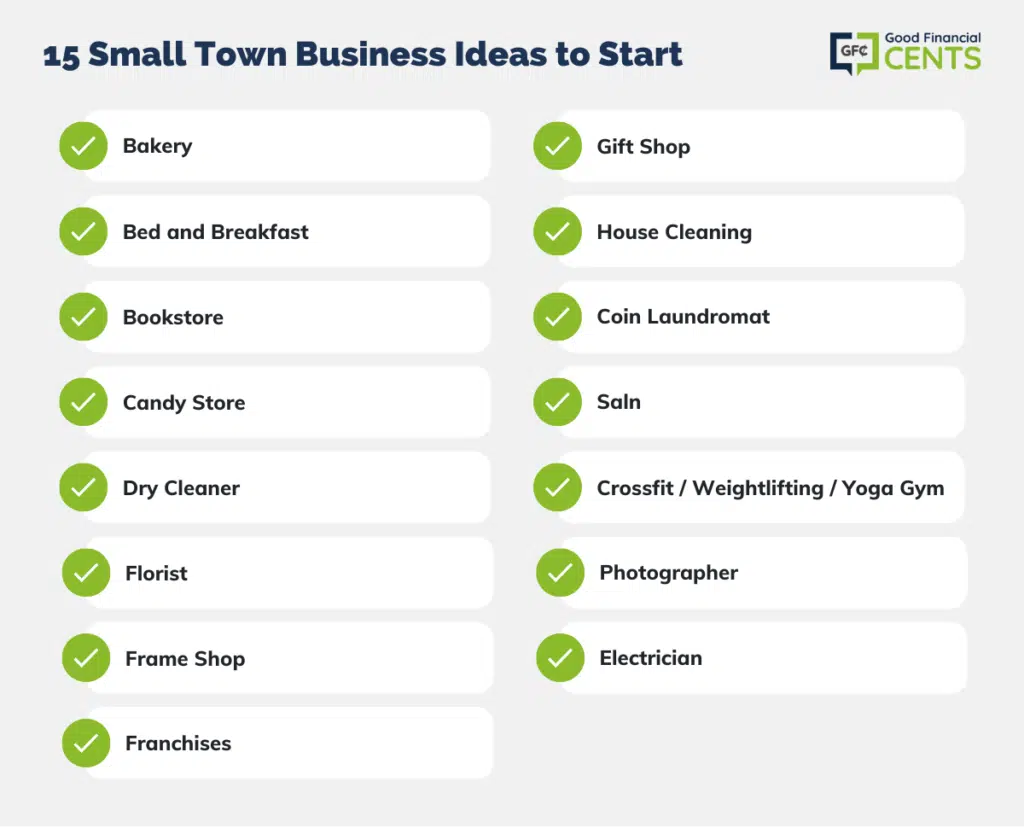“There’s a lot more business out there in small town America than I ever dreamed of.”
-Sam Walton
It never fails that I get a puzzled look when I tell people where I’m from.
I was born on the West Coast—Los Angeles, to be exact.
For about 3 years of my adult life (and 3 as a child) I was surrounded by the 405 freeway, beaches, smog, and, of course – In N Out Burger!
But I now reside in a small Midwestern town in Southern Illinois.
No freeways, just highways or “routes,” where “traffic” does not exist.
We have beaches; they’re just on lakes. I promise, it’s not as exciting as the Pacific Ocean.
And worst of all… no In-N-Out burger. 🙁
People are generally curious about this, and want to know how the heck I ended up here after growing up in the big city.
I can tell that most of them wonder why I would give up city life to surround myself by farmland and, in turn, limit my opportunities.
Their thinking is that you have to move someplace big to make it big.
That couldn’t be any further from the truth.
Small towns offer plenty of opportunities to entrepreneurs, particularly if they know the community well.
A recent study by Olav Sorenson of the Yale School of Management showed that small business ventures perform much better when they are founded in the hometown of the entrepreneur.
In terms of dollars and cents, Sorenson discovered that “each year a founder lived in the region reduced the failure rate [of the business] by nearly 2%, and each additional year of tenure translated into $1,362 more in profits in each year of operation.”
Sorenson speculates that this hometown advantage allows local entrepreneurs to understand the needs and fit of the region, in addition to having a better network of potential customers, employees, and social connections who will advertise through word of mouth for free.
The takeaway for the average small-town entrepreneur: knowing your community is incredibly valuable.
The importance of understanding a community means that not every business venture will fit in every small town. However, every town has some needs in common.
Here are 15 small business ideas that every community needs, and some ideas for making them work in your hometown:
Table of Contents
1. Bakery
Whether you’re selling freshly baked bread, cookies, pastries, or beautiful art cakes for weddings and parties, you’ll find that every town loves a bakery.
Depending on the type of baking you want to do, this may require some background education, although Beth Murdoch and Sommer Meade of The Pink Cupcake in Mount Vernon, Ohio, got started by making cakes out of their home kitchens over seven years ago.
They have found, however, that their wares really help to drive their business. According to Beth, “We generate business from word of mouth. Each birthday cake goes to a party with lots of people, so we try to make every cake really special.”
2. Bed and Breakfast
These small inns are a great business idea for any historic homeowner. And while B&Bs do best in areas that have tourism, it’s important to remember that the definition of tourism does not mean that you have to have traditional sightseeing in your small town.
For example, small towns located in or near colleges always need accommodations for visiting professors, parents, prospective students, alumni, and speakers. And who wouldn’t prefer to stay in a cozy and beautifully kept historic home where a delicious breakfast is provided?
3. Bookstore
In the modern age of e-readers and online shopping, it can be tempting to think of a bookstore as a quaint throwback. But that’s simply not true. As Jennifer Streisand points out in Lafayette Magazine, “There is one reading activity that no device can take away: the joy of browsing in an eclectic bookstore.”
Bookstores and small towns simply go together.
Not only do these small businesses offer an incomparable opportunity for dedicated readers to discover unexpected treasures, but they also provide a community with an important space for events like poetry readings, book clubs, game nights, and other activities.
It’s also important to remember that no matter how sophisticated Amazon’s algorithms may be for suggesting titles, nothing compares to talking to a well-read bookseller.
Tricia Blomgren and Kevin Flanagan, owners of the Sci-Fi and Fantasy bookstore Robots and Rogues in Lafayette, Indiana, say that they “find joy in being able to offer and recommend books in their favorite genres, which are increasingly hard to come by at larger retailers and most bookstores.”
4. Candy Store
You would have to travel far and wide to find a small town that did not have either plenty of children or plenty of sweet-toothed adults.
Candy stores can offer any number of opportunities for entrepreneurs: they can include a soda fountain and ice cream parlor, they can showcase a candy artisan’s homemade work, they can offer sugar-free, organic, gluten-free, or other diet-sensitive treats, they can offer coffee treats for those who prefer a little caffeine with their sugar, or they can share space with an old-fashioned lunch counter.
The possibilities are nearly endless.
5. Dry Cleaner
Even the most rural small towns have citizens who need their clothes professionally cleaned. In fact, opening the first dry cleaning business in a small town means you don’t have to compete with a saturated market.
Considering the fact that the U.S. Census Bureau estimates that the industry grosses $23 billion per year, this is definitely a stable industry for a new small business owner.
6. Florist
Special occasions, both happy and sad, call for flowers. Every small town has weddings, funerals, and high school dances, not to mention traditional floral holidays like Mother’s Day and Easter.
Add in the year-round need for hostess gifts, anniversary and birthday presents, and ways for husbands to get out of the doghouse, and it’s pretty clear that a florist can find business in pretty much any community.
7. Frame Shop
Even if your local community is not known for its art collections, it probably could still use a custom frame shop. Whether or not your community buys original artwork, there are still diplomas, photographs, and keepsakes to frame.
A smart framer would also take advantage of local pride by offering frames, posters, and gifts related to nearby colleges, schools, monuments, parks, or other points of interest in the area.
This kind of stock will not only give locals something to buy to show off their hometown pride, but it will also provide excellent souvenirs for tourists and visitors.
8. Franchises
The benefits of investing in a franchise are fairly obvious: you can rely on the national marketing and advertising budget behind your brand and your customers are already familiar with your product.
You may think that a franchise would not be interested in your small town, but that’s not necessarily the case.
According to Greg Tanner of the International Franchise Association, “Instead of focusing on larger cities for leads being fought over by multiple franchises, many franchisors have found great success by researching and identifying smaller communities across the nation in which their franchise concepts would thrive.”
9. Gift Shop
Gift shops are an important part of any town’s retail district, as they offer unique gifts for special occasions, especially joyous ones.
Owning Two Tulips, a Lafayette, Indiana area gift shop, has allowed owner Cheryl Woody an opportunity to get to know people at some of the happiest moments of their lives: weddings, births, holidays, etc.
And it is those relationships with customers that help to drive her business: “Every customer today has many options and many stores to choose from. It’s so important to build relationships with my customers while they are in the store. It is my goal to help them find solutions.
For example, much of my business is custom personalized products, like brides who are looking for custom wedding invitations. Those customers need to know that my selections are wide and my service is excellent.”
10. House Cleaning
Like dry cleaning, house cleaning is another industry that will pretty much always have customers.
Handling the types of regular cleaning jobs that the average homeowner doesn’t have the time or inclination to do is one end of the cleaning spectrum—at the other end is tackling very specific jobs like window cleaning, industrial or office cleaning, or even estate cleanups.
11. Coin Laundromat
Everyone needs clean clothes, so Laundromats are great small businesses for small-town entrepreneurs.
Not only are these businesses fairly low maintenance with a relatively high ROI—according to Laundromat Business, some coin laundries return up to 25%—they’re very recession proof since clothes always need to be cleaned.
Also, although the startup paperwork for a Laundromat can be a little overwhelming, that does mean that selling your coin laundry business is very easy—other investors would be interested in the ease and ROI of the business and would prefer to skip the tough paperwork.
12. Salon
It used to be that a manicure and pedicure were only luxuries for the rich. These days, however, the cost is low enough that nearly anyone can afford a weekly date with their favorite nail technician. Opening a salon does require specific training—either your own or your employees.
However, considering the fact that the training could be as simple as learning how to handle nail care in order to open or work in a manicure/pedicure-only salon—or as elaborate as learning hair styling, massage, waxing, and many other high-end procedures for a more spa-like salon.
Salons can fit whatever needs a particular community might have.
13. Crossfit / Weightlifting / Yoga Gym
There are always going to be individuals looking to get in shape. A local gym gives your community just that. The trick is creating a gym that best suits local interests.
For example, in our area, there are Gold Gym’s, locally owned gyms, and 4 Crossfit boxes. What you don’t see are any Yoga studios. I think it would be harder for a pure Yoga studio to survive here, but could definitely do well in another small town.
14. Photographer
Say cheese! People will always be getting married, having babies, and wanting to capture all those memories in the form of a photograph. My best friend, Jason York of Jason York Photography set out to follow his dream and did.
Where most people thought he could never make it following his “pipe dream,” he set up shop in his hometown of 8,500, where most of his critics reside.
Almost 10 years later, he has built his business even beyond his own expectations and is widely regarded as one of the best photographers in our area. He’s a testament to how a small business idea can thrive in a small town.
15. Electrician
Tired of seeing so many electricians take shortcuts and put families at risk, Jason Shadowens decided to do something different. Wanting to have control of his business and not have to abide by the rules of local unions, he set up his own shop, Electrical Detectives, and never looked back.

The Bottom Line on Small Business Ideas
Small towns are a great place for local entrepreneurs to establish businesses that will thrive. As long as you know your community and your market, there’s no reason you can’t make it big while still living small.
What small-town business ideas do you see thriving in your own local community?








I think either your link to Jason York’s webpage is broken or he’s not doing as well as you suggest
Hi! Im also from Los Angeles and at by 28th birthday I got tired of the big city packed and move not only to a small town but I went drastic with it and move to the Mexican peninsula (merida, yucatan) its easy to feel like you are in paradise with all of the tropical landscape around here, cenotes, pyramids, the beach, and cancun only 2 hours away. Im stuck tho, im currently working from home but my plan is to start a business, and thats where Im stuck, lol. any ideas?
i live in a very small town. small town, big hearts! I would love to open a salon and a bakery…have no clue where to go for capital. thank you for the article.
@melissa your relatives were going through something called temporary defeat lol. read this next line. in every adversity where there is failure there is a equivalent of a greater benefit .a miracle will happen write when a individual is about to give up. its not failure its temporary defeat persistance will pay off
I think each of the suggestions you make have potential, the proviso being that market research has to be done thoroughly as well as business plan. It is too easy to commit to some serious expenses and then find out that the business is not supported or does not generate sufficient cash flow. As with all businesses, an owner has to ensure that he can market successfully and reach his desired clientele in sufficient quantity so that he can convert them into paying customers.
Interesting list… though I think some of them should be qualified as potential part-time businesses. For example, to pay yourself and rent/overhead for a framing shop, you’d probably need to sell a few hundred dollars worth per day, let alone the cost of capital!
I live in a small town and sometimes it’s no surprise when businesses go out of business, they don’t seem to have reasonably thought through their potential market, nor tried it out in a less-committal fashion first. That said, some people have done well for themselves.
I have lived in a small town where there were lots of gourmet shops, and stands at the farmer’s market. People just loved to come over and buy locally produced foods, like cheese or sausages.
Knowing the person who made your food is very appealing. I am hoping to start a B&B with a small food service in the next few months, as I enjoy sharing the food I make with others too.
Ah, my In-N-Out Burger friend, let’s petition In-N-Out to bring their Double-Double Animal Style goodness to the Midwest (I’m in Michigan).
I was just in Arizona two weeks ago and enjoyed In-N-Out twice. And got a new t-shirt.
Thanks for sharing this list. I have a friend from church who opened a floral business out of his home. He’s really enjoying it.
Love the ideas. House cleaning probably has the lowest start up cost and can get you clients quickly. Gyms can be tough. I have had two relatives try to open gyms, and they both failed.
@ Melissa Bummer about your relatives and their gyms. Maybe they should look into a Crossfit gym. I would definitely go! 🙂
Jeff,
After sitting on the 405 for an hour today (to go 10 miles), small town life doesn’t sound too bad.
@ Brent If I was stuck on the 405 again, the only way it would be acceptable if I had In-N-Out Burger in the car with me.
Ride a Bike!
Jeff, that’s some pretty good research. I think a cafe/ coffee shop should also be in the list even though you have a bakery and a candy store, I think coffee stores are need in every town.